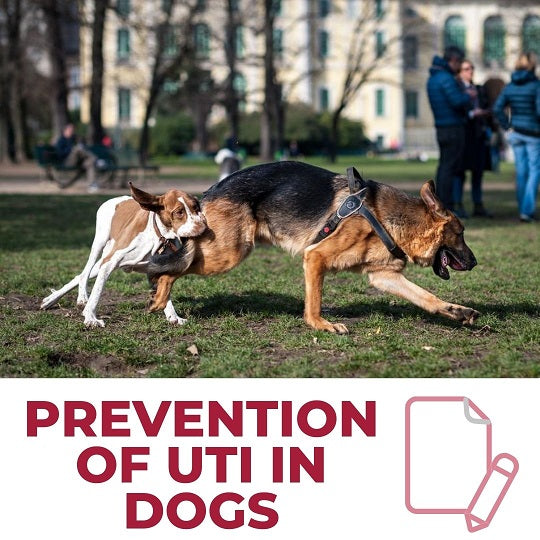
Prevention of Urinary Tract Infections in Dogs
Normally, your dog’s natural immune system defense works to prevent UTIs. However, sometimes the immune system is overwhelmed by a particularly large number of bacteria. Dogs with underlying disease may be more immune suppressed than normal and therefore can be more susceptible as well.

Lifestyle Changes
Encouraging your dog to drink a lot of water throughout the day and frequent trips outside to urinate may be one of the things you can do to prevent urinary tract infections in dogs. Try to avoid situations that will require your dog to hold her urine for extended periods of time. If possible have someone walk her during the day while you are away from home.
Ensure your dog stays clean and sanitary. If you have a long-haired dog, it may be a good idea to trim the hair around her anus and vulva to prevent trapping of fecal material that may contaminate the vulva and the urinary tract. Wiping the vulva regularly with antibiotic wipes can also help prevent ascending infections.
Supplementation
There are several supplements on the market that may help to keep the urinary tract healthy.
Diet
Diet can play a role in urine health, particularly with urolith formation. If your dog has uroliths (stones) your veterinarian will likely recommend a diet specifically designed for the conditions that promote formation of that particular stone. Normal urine should have a pH of 5.0-7.5. Alkaline urine can be caused by urinary tract infections and provides a good environment for urolith formation. One of the most common uroliths diagnosed in dogs is struvite. Dietary goals for dissolution/prevention of this type of stone is acidification of the urine (pH <6), and reduction in magnesium, protein and phosphate. Another commonly diagnosed urolith in dogs is calcium oxalate stones. These stones have to be removed surgically and often recur so dietary management is an important mainstay in prevention. These diets are low oxalate, low protein and low sodium. They are designed to maintain urine pH around 6.5.
One diet does not fit all with urinary issues. Therefore, it is important to consult with your vet to determine what diet is best for your dog’s specific conditions.
Treating Underlying Disease
Dogs with chronic renal failure, hyperadrenocorticism (Cushing’s disease), and diabetes mellitus will be more prone to acquiring UTIs. These conditions should be ruled out in a dog with recurrent or complicated UTIs. If an underlying disease is present, appropriate treatment of the underlying condition can help reduce the frequency and severity of UTIs.
Other dogs with congenital conditions such as ectopic ureters, or recessed vulvas will need surgical intervention to address the problems. Dogs with urinary sphincter incompetence (incontinence) are also more prone to UTIs. Medication for incontinence may help prevent infections.
Some other underlying conditions to rule out for recurrent UTI are urinary stones, prostatitis in male dogs, and tumors of the urinary bladder.
If you have any concerns about your pup's health always consult your veterinarian





